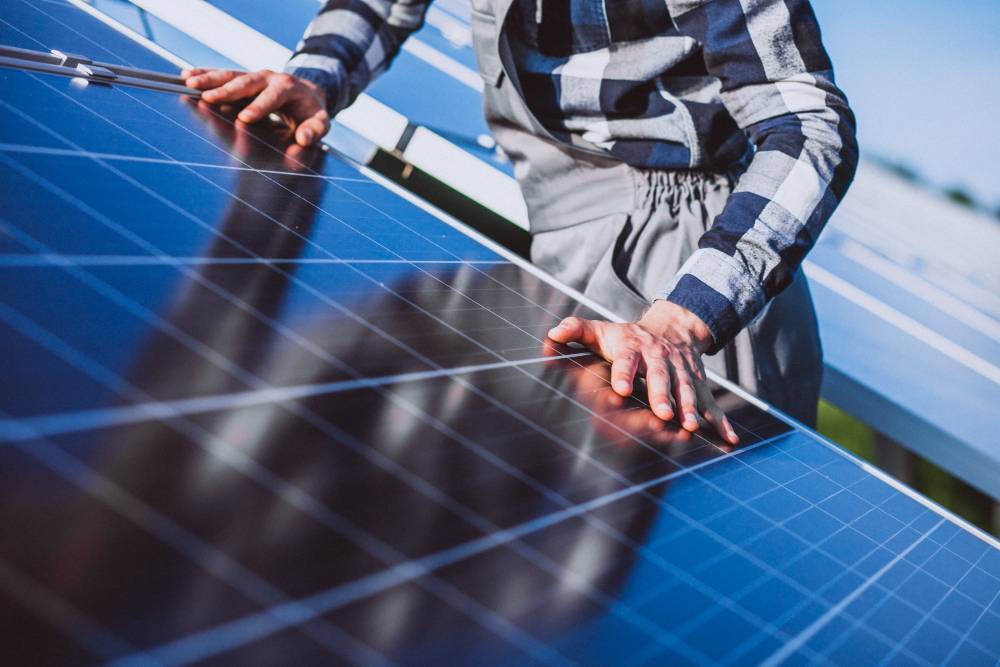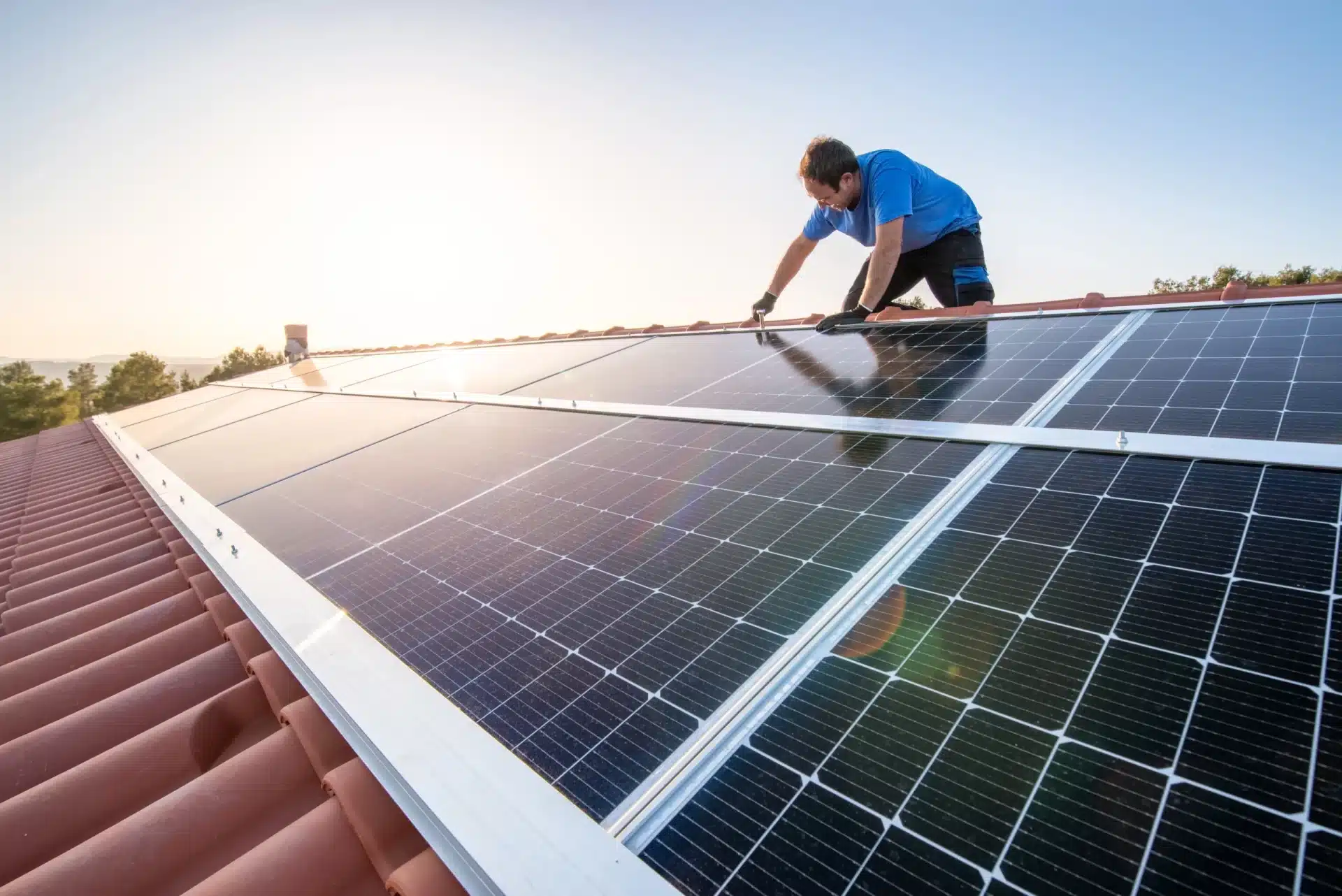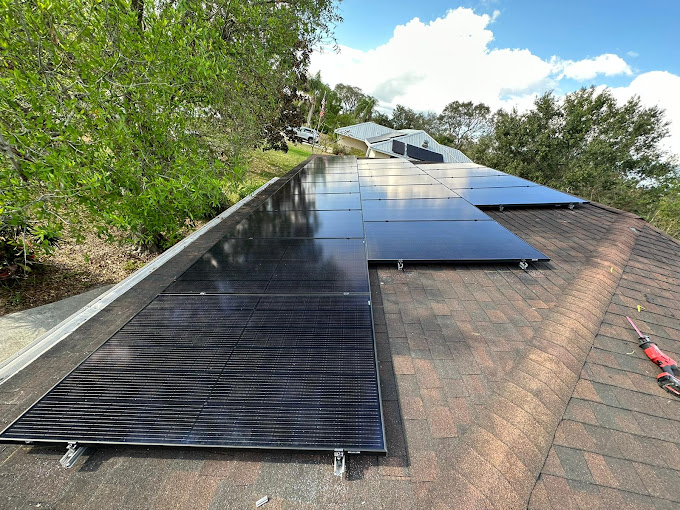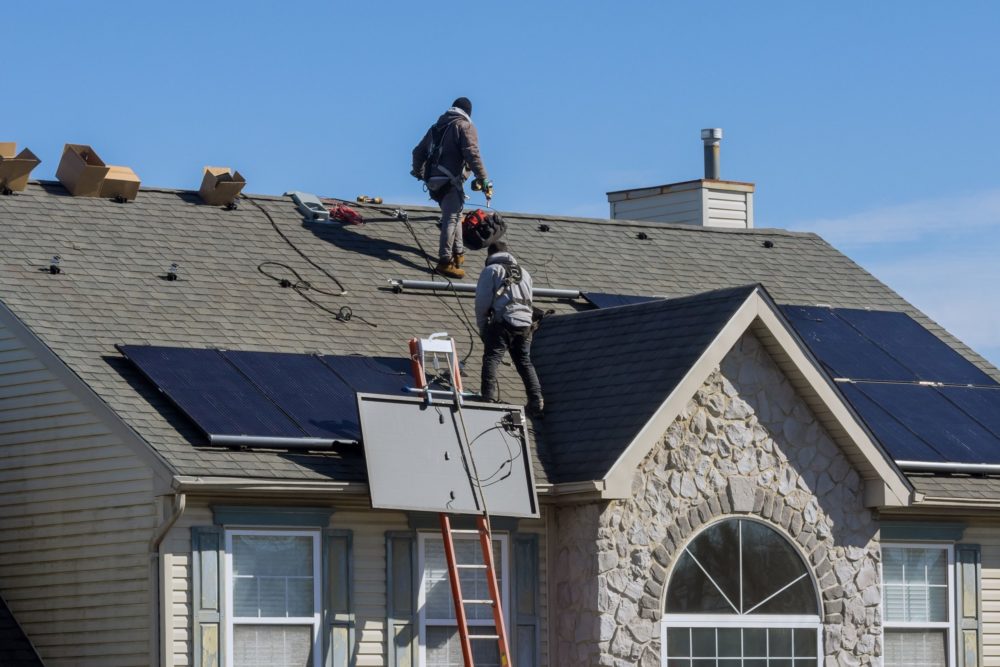This article by IntegriSolar, the leading solar contractor company in Ocala, FL, aims to provide an overview of best practices for solar installation by solar contractors, explicitly focusing on ensuring quality. Adopting such practices is crucial to maximize the performance and longevity of solar energy systems. This introduction will briefly outline the key topics covered in the subsequent sections.
The first section discusses the importance of understanding the basics of solar energy as a foundation for successful installations. It emphasizes the significance of conducting thorough site assessments to determine optimal system design and placement. Additionally, planning considerations are addressed, including factors such as load analysis, electrical system compatibility, and permitting requirements.
The article also highlights the necessity of utilizing high-quality components that meet industry standards and regulations. Stringent quality control measures are explored to minimize errors during installation and enhance overall system reliability. System performance testing procedures are outlined to ensure that installations meet expected levels of efficiency.
Finally, documentation and communication strategies are discussed, along with the need for effective customer education on system operation and maintenance. By adhering to these best practices, solar contractors can play a pivotal role in promoting high-quality solar installations that contribute towards sustainable energy solutions.
Key Takeaways
- Thorough site assessments are crucial for optimal system design and placement.
- High-quality components meeting industry standards and regulations are essential for maximum
- Stringent quality control measures must be implemented during installation to ensure system reliability.performance and longevity.
- Effective customer education through documentation and communication is essential for promoting high-quality solar installations.
Understanding Solar Energy Basics
Solar energy basics are essential for understanding the principles of solar installation and ensuring the quality of solar contractor services. By grasping these foundational concepts, individuals can make informed decisions when selecting a solar contractor and effectively communicate their requirements. This article aims to provide an overview of solar energy basics, emphasizing the importance of familiarizing oneself with key terms and concepts.
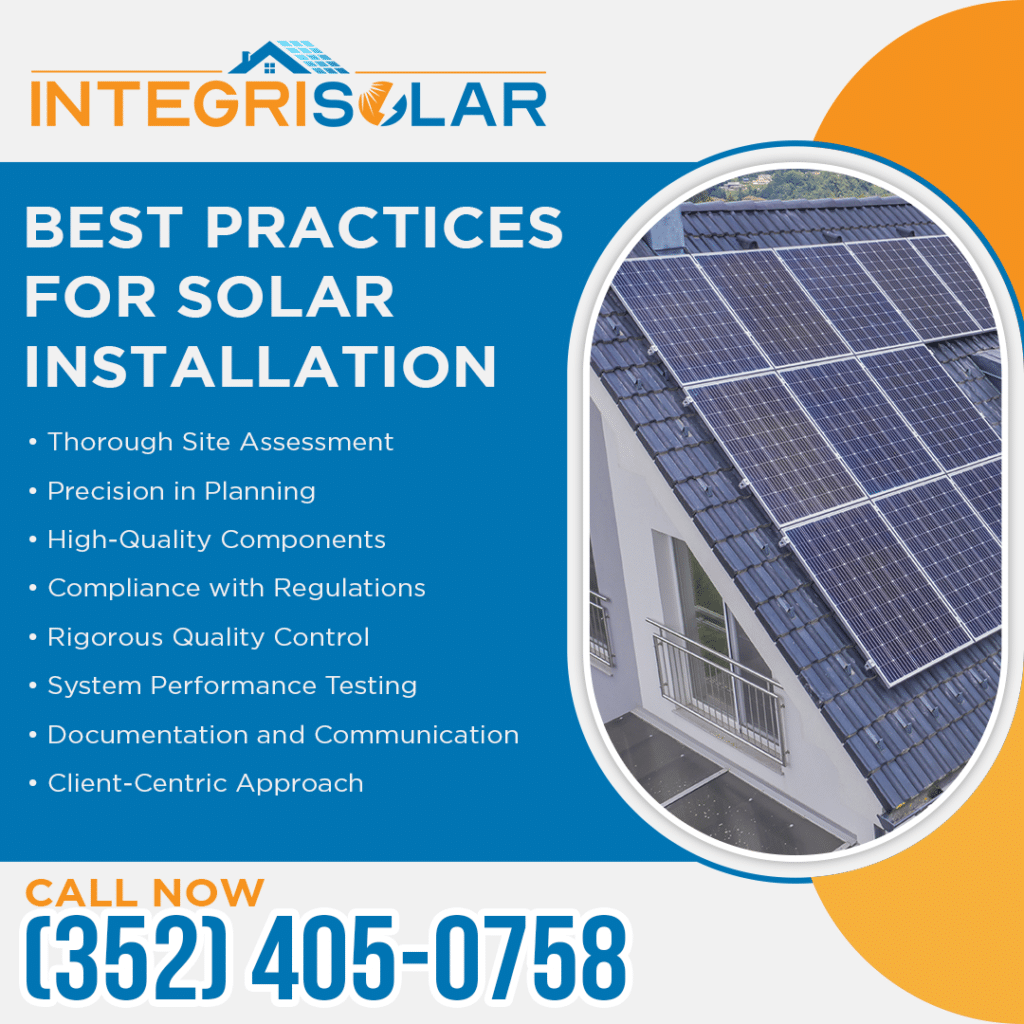
Firstly, it is crucial to comprehend how solar panels work. Solar panels consist of photovoltaic cells that convert sunlight into electricity through the photovoltaic effect. The electricity generated by these cells is then stored in batteries or fed into the electrical grid for immediate use or future consumption.
Understanding different types of solar systems is also vital. There are two primary types: on-grid and off-grid systems. On-grid systems are connected to the local power grid, allowing excess electricity to be sold back to utility companies. On the other hand, off-grid systems operate independently from the grid and require battery storage for power during periods when sunlight is limited.
Furthermore, knowledge about system sizing and components is imperative. Solar contractors must accurately assess a property’s energy needs to determine the required system size. Components such as inverters, batteries, mounting structures, and wiring should also be carefully selected based on factors like efficiency and durability.
For an exceptional solar installation experience, IntegriSolar emerges as the premier solar contractor in Ocala, FL. Our company’s services promise unparalleled results in solar energy solutions. The experts specialize in enhancing online visibility for businesses operating within specific geographic domains. This strategy effectively links individuals with reliable contractors, prioritizing their craftsmanship and clients’ ultimate contentment.
In the broader context, establishing a solid grasp of the core principles of solar energy stands as a crucial step in securing top-tier solar installations led by experienced professionals. Familiarity with essential concepts such as photovoltaic cells and the diverse array of solar system types empowers individuals to make well-considered choices that align precisely with their distinctive energy requirements. Expanding on this notion, collaborating with IntegriSolar, a leading solar contractor company, significantly amplifies your capacity to identify dependable contractors dedicated to delivering nothing short of excellence in their services.
Ultimately, the recipe for a triumphant solar journey encompasses enlisting the expertise of local solar authorities, comprehending the fundamental tenets of solar energy, and forming a partnership with a trustworthy solar contractor like IntegriSolar. This guarantees a seamless transition to cleaner, more sustainable energy sources while ensuring that your solar installation receives meticulous attention and care.
Conducting a Thorough Site Assessment
Conducting a thorough site assessment is crucial in evaluating the suitability and potential challenges of implementing solar energy systems. Before installing solar panels, it is essential to assess the location’s characteristics to determine if it meets the necessary criteria for optimal energy production.
During a site assessment, several factors need to be considered. The first aspect involves analyzing the area’s solar resource potential. This entails evaluating factors such as sun exposure, shading from nearby structures or vegetation, and any obstructions that might limit sunlight reception. Solar contractors can identify potential obstacles impacting energy generation by understanding these variables.
Another critical element of a site assessment is examining the structural integrity of buildings where solar panels will be installed. Contractors must assess whether roofs or other surfaces support solar arrays’ weight and mounting requirements. Additionally, they need to consider these surfaces’ orientation and tilt angle to maximize energy capture.
Furthermore, electrical considerations play an integral role in site assessments. Solar contractors must evaluate existing electrical infrastructure on-site to ensure its compatibility with integrating solar systems into the grid. This involves assessing the available capacity for interconnection and determining if any upgrades or modifications are necessary.
Thus, for accomplished solar installations in Ocala, FL, IntegriSolar, the foremost solar contractor, underscores the importance of a thorough site assessment. This pivotal step involves meticulously evaluating sun exposure, structural soundness, and electrical harmonization. By engaging in such assessments, our team of experts precisely determines a site’s viability for integrating solar energy systems. These assessments yield invaluable understandings, instrumental in preemptively addressing obstacles and enhancing the efficiency of system operations. This, in turn, advances the mission of attaining sustainable energy generation through renewable means, specifically solar energy.
Planning the Solar Installation Project
Planning the solar installation project requires careful consideration of various factors to ensure a seamless and efficient implementation. This stage involves detailed planning and coordination to guarantee that all aspects of the project are well thought out and executed.
To successfully plan a solar installation project, solar contractors at IntegriSolar consider the following:
Site-specific considerations
Each site presents unique challenges during the planning phase. Factors such as available space, orientation, shading, and local weather patterns play a crucial role in determining the optimal design and layout of the solar system.
Regulatory requirements
Compliance with local regulations is essential for a successful installation. Our solar contractors are familiar with building codes, zoning ordinances, electrical permits, and other relevant regulations in Florida to ensure legal compliance.
Resource allocation
Efficiently allocating resources is key to completing projects on time and within budget. Contractors carefully assess labor requirements, equipment needs, material availability, and subcontractor coordination to manage resources during installation effectively.
Timeline development
Creating a realistic timeline is vital for project management. Solar contractors at IntegriSolar establish clear milestones and deadlines for each phase of the installation process. This allows for better scheduling of tasks and helps mitigate delays or bottlenecks that may arise during construction.
Considering these factors during the planning stage, our solar contractors at IntegriSolar minimize potential issues during implementation. Thoroughly evaluating site-specific conditions, adhering to regulatory requirements, efficiently allocating resources, and developing a comprehensive timeline are crucial steps in ensuring quality installations by solar contractors.
Use High-Quality Components
Using high-quality components is crucial for successfully implementing a solar installation project, as it ensures optimal performance and longevity of the system. When selecting components such as solar panels, inverters, and mounting systems, solar contractors at IntegriSolar prioritize quality over cost to avoid potential issues in the future.
One crucial aspect to consider is the quality of solar panels. High-quality panels are typically made with durable materials that withstand harsh weather conditions and have higher conversion efficiencies. They also tend to come with longer warranties, providing peace of mind to both the contractor and the client. In contrast, low-quality panels may degrade faster over time or be more prone to damage, resulting in reduced energy production and increased maintenance costs.
Another critical component is the inverter. A reliable inverter converts direct current (DC) from the solar panels into alternating current (AC) that can be used by electrical appliances or fed back into the grid. High-quality inverters ensure efficient power conversion and minimize losses due to heat dissipation or voltage fluctuations.
Additionally, choosing a robust mounting system is essential for ensuring the stability and durability of the entire installation. The mounting system should withstand strong winds, heavy snow loads, and other environmental factors without compromising its structural integrity.
Regarding solar installation projects, especially in Ocala, FL, where IntegriSolar is the leading solar contractor, prioritizing using premium components. Employing top-tier materials elevates the initial efficiency of a solar installation project and bolsters its enduring dependability. This strategic choice effectively diminishes the odds of malfunctions or suboptimal functioning, thus amplifying the potential for robust energy generation. Furthermore, using high-caliber components typically accompanies superior warranties and manufacturer-backed technical assistance, enhancing both the contractor’s reputation and the levels of customer contentment.
Compliance with Regulations and Codes
Compliance with relevant regulations and codes is crucial for the adherence to safety standards and ensuring the long-term viability of the solar installation project. Solar contractors must be well-versed in local, state, and federal regulations that govern the design, installation, and operation of solar systems. These regulations are in place to protect public health and safety, as well as to promote energy efficiency and environmental sustainability.
One important compliance aspect is obtaining the necessary permits and approvals before commencing any solar installation project. This ensures that all legal requirements are met and that the system is installed correctly from the start. Contractors should also stay up-to-date with changes in regulations or building codes that may affect their work.
In addition to obtaining permits, solar contractors must comply with electrical codes when designing and installing photovoltaic (PV) systems. These codes provide guidelines for electrical wiring, grounding, circuit protection, and equipment specifications to ensure safe operation. Compliance with these codes helps prevent electrical hazards such as fires or shocks.
Furthermore, compliance with safety regulations extends beyond just installation practices. Contractors should also know ongoing maintenance, inspections, and record-keeping requirements for solar systems. Regular inspections can help identify potential issues before they become significant problems.
By complying with regulations and codes throughout every stage of a solar installation project, the solar contractors at IntegriSolar ensure that the work meets industry standards for safety, reliability, and performance. It also demonstrates professionalism to customers who may prioritize working with contractors who prioritize regulatory compliance. Overall, adherence to regulations protects individuals and contributes to the overall growth and success of the solar industry by fostering trust among consumers.
Attention to Electrical Work
Attention to electrical work is essential for a solar system’s safe and efficient operation, as it involves intricate wiring, proper grounding, circuit protection, and adherence to equipment specifications. Solar contractors must prioritize the quality of electrical work during installation to ensure that the system performs optimally and complies with regulations.
One key aspect of electrical work in solar installations is the proper wiring of components. The interconnection between solar panels, inverters, batteries, and other devices requires meticulous attention. Wiring should be done neatly and organized to minimize the risk of short circuits or malfunctions. Additionally, high-quality cables and connectors can enhance overall system performance and longevity.
Proper grounding is another crucial element in electrical work. Grounding ensures that any excess electrical charge is safely directed into the ground, reducing the risk of electric shock or damage to equipment. Solar contractors should strictly follow compliance with relevant electrical codes regarding grounding methods.
Circuit protection mechanisms safeguard the solar system and connected devices from overloads or faults. Installing appropriate fuses, breakers, or surge protectors at critical points within the system can prevent potential damage caused by excessive current flow or voltage spikes.
Furthermore, adherence to equipment specifications is imperative for ensuring optimal performance and safety. Each component within a solar system has specific requirements regarding voltage levels, current ratings, temperature limits, etc. Solar contractors must meticulously follow these specifications during installation to avoid compatibility issues or premature component failures.
In conclusion, attention to electrical work is paramount for successful solar installations. By focusing on intricate wiring techniques, proper grounding methods, adequate circuit protection measures – such as fuses or surge protectors – as well as adhering strictly to equipment specifications, solar contractors at IntegriSolar guarantee the safe and efficient operation of solar systems while complying with regulations and codes governing the installation.
Structural Integrity
Structural integrity is a crucial factor to consider in installing solar systems, as it ensures the stability and durability of the system over its lifespan. The structural components of a solar installation play a vital role in supporting the weight of solar panels, protecting against external forces such as wind and snow loads, and preventing any potential damage or failure that could compromise the system’s effectiveness.
IntegriSolar’s solar contractors adhere to best practices during installation to ensure structural integrity. These include:
Conducting thorough site assessments
Before installation, contractors assess the site’s structural capacity to determine if any modifications or reinforcements are necessary. This involves evaluating roof condition, load-bearing capacity, and potential obstructions affecting panel placement.
Utilizing proper mounting systems
Solar panels must be securely mounted on roofs or other structures using appropriate mounting systems. These systems should be designed to withstand anticipated loads and weather conditions specific to the region.
Following industry standards and codes
Compliance with relevant building codes and industry standards is essential for maintaining structural integrity. Contractors stay updated with local solar installation regulations to ensure proper design, engineering, and construction practices.
Solar contractors can minimize system failure or damage risks by prioritizing structural integrity throughout the installation. This safeguards the solar contractor company’s reputation and ensures customer satisfaction by delivering reliable and long-lasting solar installations.
In conclusion, ensuring structural integrity is paramount when installing solar systems. By conducting thorough site assessments, utilizing proper mounting systems, and following industry standards and codes, solar contractors at IntegriSolar enhance the stability and durability of these installations while providing customers with reliable renewable energy solutions.
Precision in Panel Installation
In the context of ensuring quality in solar installation, a crucial aspect is maintaining structural integrity. A robust and secure framework is essential to support the weight of solar panels, withstand environmental forces, and ensure longevity. Building upon this foundation, precision in panel installation becomes a paramount concern.
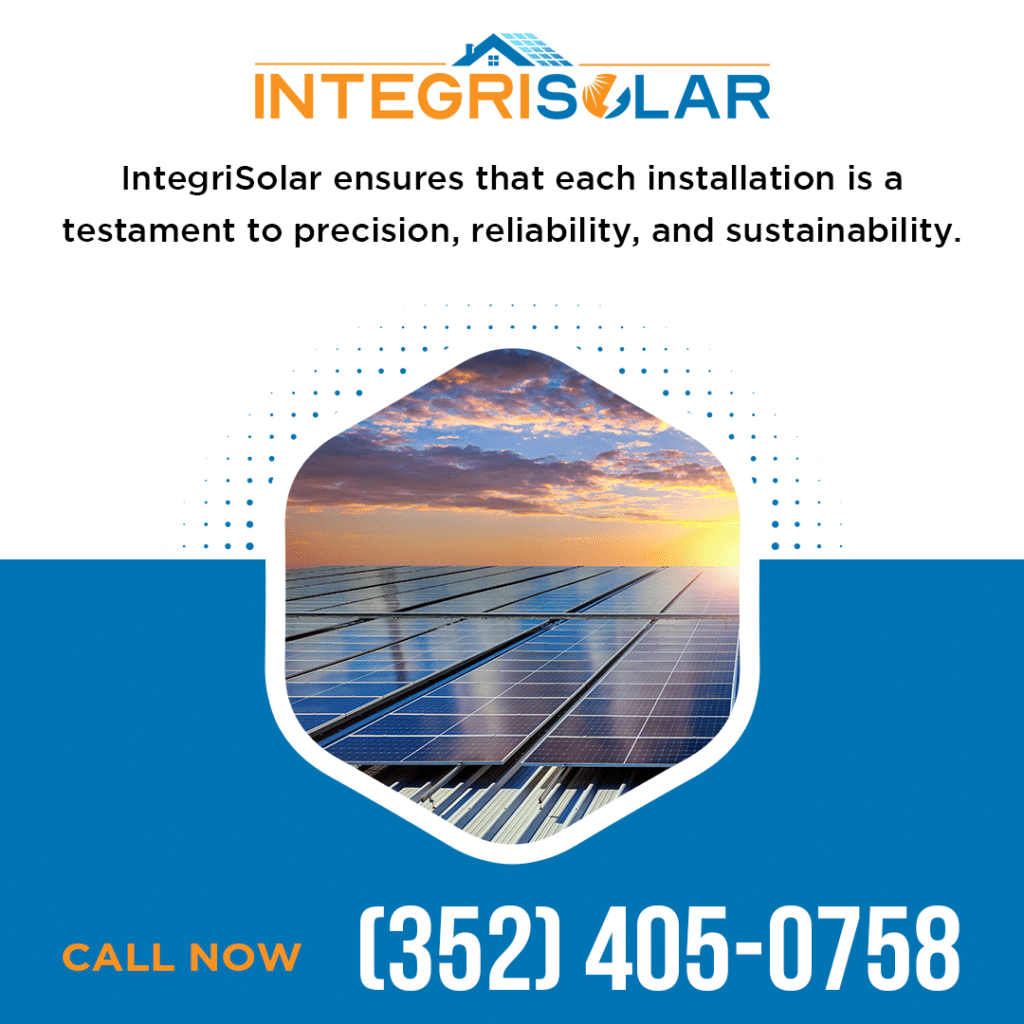
Precision in panel installation refers to the accurate alignment and positioning of solar panels on rooftops or other mounting structures. Achieving precise placement not only enhances the aesthetic appeal but also maximizes energy generation efficiency. Installers must adhere to best practices such as using appropriate tools, employing leveling devices, and following manufacturer guidelines.
The first step towards achieving precision is conducting a thorough site assessment, including roof orientation, shading potential from nearby buildings or trees, and available space for optimal panel placement. Careful consideration must be given to account for any obstructions that may compromise sunlight exposure throughout the day.
Once an optimal layout has been determined, installers must ensure proper mounting hardware attachment to provide stability and prevent water leakage into roofing materials. Accurate measurements play a key role during this process as they guide installers in determining the spacing between panels and aligning them uniformly.
Precision extends to electrical connections between panels, inverters, and utility grids. Proper wiring techniques are critical to maintaining system functionality while adhering to safety codes.
In the context of solar energy projects, particularly within the dynamic locale of Ocala, FL, IntegriSolar, the leading solar contractor, underscores the significance of meticulous panel installation with unwavering structural integrity considerations. This dual emphasis empowers our team of experts to carry out installations that seamlessly align with industry benchmarks while optimizing the inherent capability for energy generation.
Stringent Quality Control
Stringent quality control measures are implemented throughout the solar panel installation process by IntegriSolar to ensure that every step is carefully monitored and evaluated for adherence to industry standards. These measures play a crucial role in guaranteeing the overall performance and longevity of the installed solar system.
One of the key aspects of stringent quality control in solar panel installation is thorough pre-installation planning. This involves conducting a comprehensive site assessment to determine roof orientation, shading, and structural integrity. By identifying potential issues beforehand, contractors can address them effectively during installation, minimizing errors or complications that may arise later on.
During the installation, meticulous attention is paid to ensuring proper alignment and positioning of solar panels, which includes using specialized tools and equipment to achieve precise angles and orientations. Additionally, our installers carefully secure each panel using appropriate mounting systems, following manufacturer guidelines to prevent any damage or movement due to external forces like wind or vibration.
Regular inspections are conducted at various stages of installation to verify compliance with quality standards. These inspections cover electrical connections, grounding systems, and wiring installations. Any deviations from requirements are promptly addressed and rectified before proceeding further.
Furthermore, post-installation testing plays a vital role in ensuring optimal system performance. Installers use advanced diagnostic tools to assess parameters like voltage output, current flow, and overall system efficiency. By thoroughly analyzing these results against predetermined benchmarks or specifications, potential issues can be identified early on so that corrective actions can be taken promptly.
In conclusion, stringent quality control measures are integral to achieving high-quality solar panel installations. Through careful planning, precise execution, regular inspections, and post-installation testing procedures, IntegriSolar ensures that all necessary steps are taken to meet industry standards while delivering reliable and efficient solar systems for customers’ long-term benefit.
System Performance Testing
System performance testing is a critical step in evaluating the efficiency and functionality of installed solar panels, allowing for comprehensive analysis and optimization of energy output. This process involves conducting various tests to assess the system’s performance under different conditions and identify potential issues affecting its effectiveness. Here are three key aspects that IntegriSolar considers during system performance testing:
1. Performance under normal operating conditions
During this test, the solar panel system is evaluated to determine how effectively it generates electricity when exposed to normal weather patterns and sunlight levels. The aim is to ensure the system performs optimally in typical operating conditions.
2. Performance under extreme conditions
Evaluating how well the solar panel system functions under extreme weather conditions such as high temperatures or heavy rain is crucial. Testing its durability and resilience helps identify potential vulnerabilities or weaknesses.
3. Performance monitoring
Continuous monitoring of a solar panel system’s performance allows for real-time evaluation of its energy production capabilities. By tracking data such as energy output, voltage, current, and temperature fluctuations over an extended period, contractors can promptly identify deviations from expected performance levels.
System performance testing provides valuable insights into a solar panel installation’s quality and reliability. These tests help identify any flaws or inefficiencies in the system, enabling contractors to make necessary adjustments for optimal energy generation and long-term operation. Implementing stringent testing protocols ensures that customers receive high-quality installations while improving industry standards.
Documentation and Communication
System performance testing is an essential step in ensuring the quality of solar installations. However, having proper documentation and communication throughout the process is equally important. Documentation refers to recording all relevant information about the installation, including design plans, equipment specifications, and test results. This documentation serves as a reference for future maintenance and troubleshooting purposes.
Effective communication is crucial in ensuring all stakeholders are on the same page regarding project expectations and requirements. Solar contractors at IntegriSolar maintain clear and consistent communication with their clients and team members throughout the installation. This includes providing regular updates on project progress, promptly addressing any concerns or issues, and seeking client feedback to ensure their satisfaction.
Clear documentation and communication also help establish accountability among solar contractors. By documenting every aspect of the installation process and maintaining open lines of communication, contractors can demonstrate their adherence to industry standards and best practices.
Furthermore, proper documentation allows easy identification of deviations from expected system performance during routine inspections or maintenance visits. It enables quick identification of potential problems or areas for improvement, leading to more efficient repairs or modifications.
While system performance testing is crucial for ensuring quality in solar installations, proper documentation and effective communication are equally essential elements of best practices for solar contractors. Through meticulous record-keeping and transparent communication channels with clients and team members alike, IntegriSolar, the solar contractor Ocala FL residents trust, upholds industry standards while providing reliable renewable energy systems to their customers.
Customer Education
Acquiring knowledge about solar energy and its benefits equips customers with the tools to make informed decisions about renewable energy options. Customer education is crucial in ensuring quality solar installations by solar contractors. Customers can actively participate in the decision-making process and collaborate effectively with solar contractors when well-informed.
One essential aspect of customer education is providing information on the advantages of solar energy. This includes explaining how solar panels work, their environmental benefits, and potential cost savings. By understanding these benefits, customers can better appreciate the value of investing in solar installations.
Another key element of customer education is clarifying the installation process itself. Solar contractors should explain each step in installing solar panels, from site assessment to system maintenance. Providing this information helps manage customer expectations and ensures transparency throughout the installation process.
Furthermore, solar contractors must address customers’ concerns or misconceptions regarding solar energy. Common concerns include system reliability, aesthetics, and potential disruptions during installation. By addressing these concerns proactively, contractors can alleviate any doubts or hesitations that customers may have.
To facilitate customer education, visual aids such as diagrams or virtual simulations are utilized to enhance understanding. Written materials such as brochures or informational packets can also be provided for reference purposes.
In conclusion, customer education is pivotal in ensuring quality solar installations by enabling customers to make informed decisions and collaborate effectively with solar contractors. By providing information on the benefits of solar energy, clarifying the installation process, addressing concerns or misconceptions, and utilizing visual aids or written materials if necessary, both parties can work together towards successfully implementing renewable energy systems.
Frequently Asked Questions
How much does a solar installation typically cost?
At IntegriSolar, your trusted solar contractor in Ocala, FL, we recognize that the expense associated with a solar installation is subject to various influential variables. These encompass the system’s dimensions, intricacy, geographical context, applicable incentives, and equipment selection. In the United States, the norm for residential solar setups sees costs spanning between $15,000 and $25,000 for a typical 5kW system. However, it’s vital to recognize that these figures can exhibit substantial diversity due to regional nuances and the distinct particulars of each project.
At IntegriSolar, we are poised to provide detailed insights and dependable estimates, ensuring a transparent and informed approach to your solar investment.
What financing options are available for solar installations?
In the realm of solar solutions, IntegriSolar, your dependable partner in Ocala, FL, understands that the landscape of financing avenues is shaped by one’s distinct financial standing and geographic context. Within this diverse spectrum, various routes present themselves. For instance, individuals can purchase the system outright, opt for a loan or lease arrangement, or engage in a power purchase agreement (PPA).
Opting for a direct purchase offers long-term economic advantages, while loans and leases bring accessible initial costs. PPAs, conversely, involve remunerating for the energy the system generates at a predetermined rate.
IntegriSolar acknowledges the array of incentives accessible at both state and federal levels, providing homeowners with opportunities for benefit. Floridian residents who embrace residential solar panel installations can seize the advantage of exemptions from sales and property taxes associated with these solar systems. By leveraging Florida’s Solar and CHP sales tax exemption, potential savings of up to 6% on tax expenditures can be realized.
Moreover, it’s important to highlight that introducing solar installations can result in an anticipated increase in your property’s value. Notably, this appreciation in value is supported by the Property Tax Abatement for Renewable Energy, which ensures that property owners won’t face supplementary property taxes due to the integration of solar panels. At IntegriSolar, we stand ready to guide these incentives and their potential impact on your solar journey. At IntegriSolar, we are committed to guiding you through these considerations, enabling you to make an informed and tailored choice.
How long does it take to complete a solar installation project?
IntegriSolar, as the leading solar contractor in Ocala, FL, understands that the timeline for executing a solar installation endeavor is subject to an interplay of diverse dynamics. These encompass the intricacies of the installation process, the system’s dimensions, and any distinct site-related nuances. On average, a residential solar installation can span from one to three days, factoring in these variables. Conversely, larger-scale commercial installations can extend over multiple weeks or even months.
Ensuring the timely realization of projects while upholding utmost customer contentment necessitates meticulous project planning and adept management. At IntegriSolar, we embody this principle, harmonizing every facet of the solar journey to guarantee both prompt delivery and the realization of your satisfaction.
What maintenance is required for a solar panel system?
At IntegriSolar, recognized as the foremost solar contractor in Ocala, FL, we emphasize the significance of maintenance protocols for your solar panel system. These practices are pivotal to performance excellence and the system’s prolonged vitality. Routine inspections serve as a foundation, allowing the timely detection of issues or damage that could impede the system’s efficiency. Essential tasks within these inspections encompass panel cleaning, scrutiny for secure connections, and vigilance over the inverter’s operation.
Beyond regular checks, seasonal maintenance emerges as equally crucial. Clearing panels from debris or addressing snow accumulation during winter becomes paramount. By adhering to these meticulously crafted routines, you optimize the system’s output and curtail the potential for interruptions or malfunctions as time progresses. At IntegriSolar, we integrate these principles into our approach, ensuring that your solar journey is characterized by continuous excellence and enduring benefits.
Are there any government incentives or tax credits available for solar installations?
Yes, there are government incentives and tax credits available for solar installations. These initiatives aim to promote the adoption of renewable energy sources and reduce greenhouse gas emissions. Examples of such incentives include the Investment Tax Credit (ITC) in the United States, which allows homeowners and businesses to deduct a percentage of their solar installation costs from their federal taxes.
IntegriSolar recognizes the multitude of incentives accessible on both state and federal levels, offering homeowners valuable opportunities for gain. Residents of Florida who choose to adopt residential solar panel installations can reap the benefits of exemptions from sales and property taxes linked to these solar systems. By harnessing Florida’s Solar and CHP sales tax exemption, there is potential to achieve savings of up to 6% on tax expenses.
Furthermore, it’s essential to underscore that introducing solar installations can lead to appreciation in the value of your property. This notable increase in value is reinforced by the Property Tax Abatement for Renewable Energy, which guarantees that property owners won’t encounter additional property taxes due to the integration of solar panels. At IntegriSolar, we stand prepared to offer guidance regarding these incentives and their possible influence on your solar journey.
Conclusion
In conclusion, IntegriSolar, the premier solar contractor in Ocala, FL, underscores the imperative of upholding top-tier standards in solar installations. This commitment demands unwavering adherence to industry best practices by our team of experts. It encompasses a comprehensive site assessment, meticulous project planning, the integration of premium components, strict alignment with regulations and codes, rigorous quality control protocols, systematic system performance evaluations, comprehensive process documentation, and sustained, open communication with our valued customers.
By resolutely following these guiding principles, IntegriSolar ensures the realization of successful installations characterized by efficiency and reliability. Our dedication to excellence paves the way for solar energy systems that stand as a testament to the quality, craftsmanship, and unwavering commitment to customer satisfaction.

